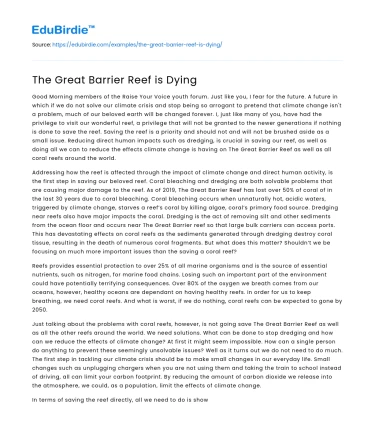Good Morning members of the Raise Your Voice youth forum. Just like you, I fear for the future. A future in which if we do not solve our climate crisis and stop being so arrogant to pretend that climate change isn't a problem, much of our beloved earth will be changed forever. I, just like many of you, have had the privilege to visit our wonderful reef, a privilege that will not be granted to the newer generations if nothing is done to save the reef. Saving the reef is a priority and should not and will not be brushed aside as a small issue. Reducing direct human impacts such as dredging, is crucial in saving our reef, as well as doing all we can to reduce the effects climate change is having on The Great Barrier Reef as well as all coral reefs around the world.
Addressing how the reef is affected through the impact of climate change and direct human activity, is the first step in saving our beloved reef. Coral bleaching and dredging are both solvable problems that are causing major damage to the reef. As of 2019, The Great Barrier Reef has lost over 50% of coral of in the last 30 years due to coral bleaching. Coral bleaching occurs when unnaturally hot, acidic waters, triggered by climate change, starves a reef’s coral by killing algae, coral’s primary food source. Dredging near reefs also have major impacts the coral. Dredging is the act of removing silt and other sediments from the ocean floor and occurs near The Great Barrier reef so that large bulk carriers can access ports. This has devastating effects on coral reefs as the sediments generated through dredging destroy coral tissue, resulting in the death of numerous coral fragments. But what does this matter? Shouldn’t we be focusing on much more important issues than the saving a coral reef?
Save your time!
We can take care of your essay
- Proper editing and formatting
- Free revision, title page, and bibliography
- Flexible prices and money-back guarantee
Reefs provides essential protection to over 25% of all marine organisms and is the source of essential nutrients, such as nitrogen, for marine food chains. Losing such an important part of the environment could have potentially terrifying consequences. Over 80% of the oxygen we breath comes from our oceans, however, healthy oceans are dependant on having healthy reefs. In order for us to keep breathing, we need coral reefs. And what is worst, if we do nothing, coral reefs can be expected to gone by 2050.
Just talking about the problems with coral reefs, however, is not going save The Great Barrier Reef as well as all the other reefs around the world. We need solutions. What can be done to stop dredging and how can we reduce the effects of climate change? At first it might seem impossible. How can a single person do anything to prevent these seemingly unsolvable issues? Well as it turns out we do not need to do much. The first step in tackling our climate crisis should be to make small changes in our everyday life. Small changes such as unplugging chargers when you are not using them and taking the train to school instead of driving, all can limit your carbon footprint. By reducing the amount of carbon dioxide we release into the atmosphere, we could, as a population, limit the effects of climate change.
In terms of saving the reef directly, all we need to do is show our support. This can be done through visiting the reef one holiday or even just simply raising awareness through have conversations about the impacts we are having on the reef.
Sadly, not all people will agree on the urgency of saving coral reefs. Even after being explicitly told why we need the reef and how we can save it, some people will still disagree. For those few people I say: We need to save The Great Barrier Reef, not just because it is an essential part of ocean and not just because it provides shelter and nutrients for much of marine life, but because we owe it to the new generations. We owe them the opportunity to experience this magical reef for themselves and for it not to just become a fairy tale because we were to lazy to do anything.
Ultimately, I urge you to take action and save our beautiful reef. Even if it is just having a conversation, if we all do our part in raising awareness, we will be able to do take our children to the Great Barrier Reef and show it to them in all its beauty. Overall, we need to show our support to the reef through reducing our carbon footprint and educating people on the effects human activity is having on The Great Barrier Reef. I hope that one day I can see the reef again, I hope that in 100 years’ time, coral reefs all around the world be full of life and colour, just as they have been for us.






 Stuck on your essay?
Stuck on your essay?

